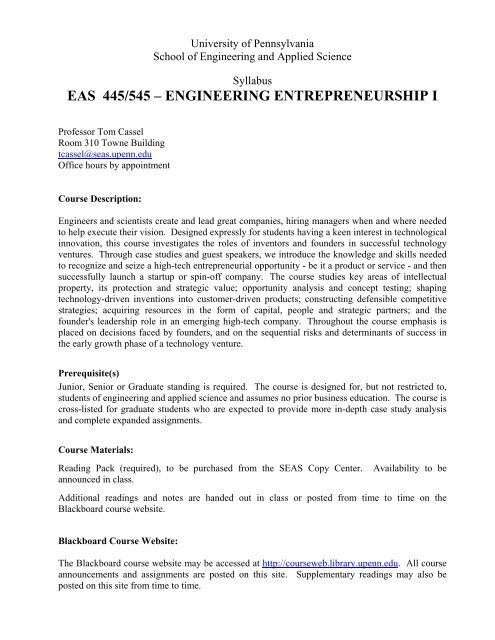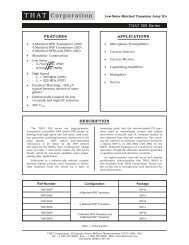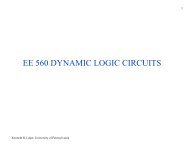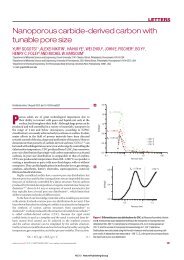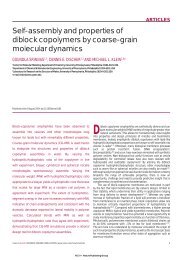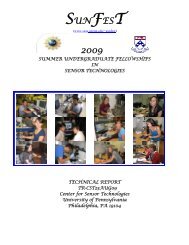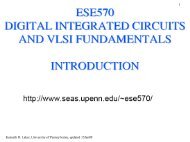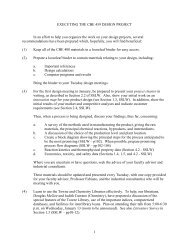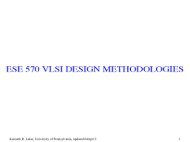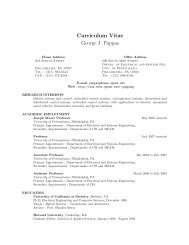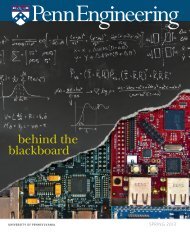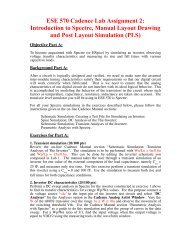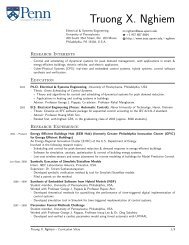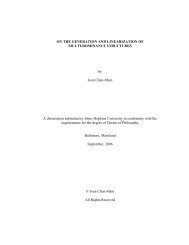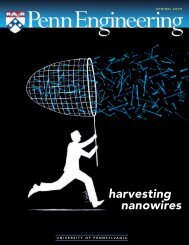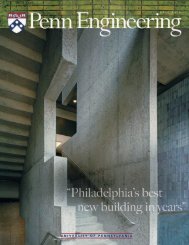eas 445/545 - the School of Engineering and Applied Science ...
eas 445/545 - the School of Engineering and Applied Science ...
eas 445/545 - the School of Engineering and Applied Science ...
Create successful ePaper yourself
Turn your PDF publications into a flip-book with our unique Google optimized e-Paper software.
University <strong>of</strong> Pennsylvania<br />
<strong>School</strong> <strong>of</strong> <strong>Engineering</strong> <strong>and</strong> <strong>Applied</strong> <strong>Science</strong><br />
Syllabus<br />
EAS <strong>445</strong>/<strong>545</strong> – ENGINEERING ENTREPRENEURSHIP I<br />
Pr<strong>of</strong>essor Tom Cassel<br />
Room 310 Towne Building<br />
tcassel@s<strong>eas</strong>.upenn.edu<br />
Office hours by appointment<br />
Course Description:<br />
Engineers <strong>and</strong> scientists create <strong>and</strong> lead great companies, hiring managers when <strong>and</strong> where needed<br />
to help execute <strong>the</strong>ir vision. Designed expressly for students having a keen interest in technological<br />
innovation, this course investigates <strong>the</strong> roles <strong>of</strong> inventors <strong>and</strong> founders in successful technology<br />
ventures. Through case studies <strong>and</strong> guest speakers, we introduce <strong>the</strong> knowledge <strong>and</strong> skills needed<br />
to recognize <strong>and</strong> seize a high-tech entrepreneurial opportunity - be it a product or service - <strong>and</strong> <strong>the</strong>n<br />
successfully launch a startup or spin-<strong>of</strong>f company. The course studies key ar<strong>eas</strong> <strong>of</strong> intellectual<br />
property, its protection <strong>and</strong> strategic value; opportunity analysis <strong>and</strong> concept testing; shaping<br />
technology-driven inventions into customer-driven products; constructing defensible competitive<br />
strategies; acquiring resources in <strong>the</strong> form <strong>of</strong> capital, people <strong>and</strong> strategic partners; <strong>and</strong> <strong>the</strong><br />
founder's leadership role in an emerging high-tech company. Throughout <strong>the</strong> course emphasis is<br />
placed on decisions faced by founders, <strong>and</strong> on <strong>the</strong> sequential risks <strong>and</strong> determinants <strong>of</strong> success in<br />
<strong>the</strong> early growth phase <strong>of</strong> a technology venture.<br />
Prerequisite(s)<br />
Junior, Senior or Graduate st<strong>and</strong>ing is required. The course is designed for, but not restricted to,<br />
students <strong>of</strong> engineering <strong>and</strong> applied science <strong>and</strong> assumes no prior business education. The course is<br />
cross-listed for graduate students who are expected to provide more in-depth case study analysis<br />
<strong>and</strong> complete exp<strong>and</strong>ed assignments.<br />
Course Materials:<br />
Reading Pack (required), to be purchased from <strong>the</strong> SEAS Copy Center. Availability to be<br />
announced in class.<br />
Additional readings <strong>and</strong> notes are h<strong>and</strong>ed out in class or posted from time to time on <strong>the</strong><br />
Blackboard course website.<br />
Blackboard Course Website:<br />
The Blackboard course website may be accessed at http://courseweb.library.upenn.edu. All course<br />
announcements <strong>and</strong> assignments are posted on this site. Supplementary readings may also be<br />
posted on this site from time to time.
Grading:<br />
Course grades are determined approximately as follows:<br />
� Class attendance <strong>and</strong> participation: 35%<br />
� Assignments <strong>and</strong> in-class quizzes: 45%<br />
� Term project: 20%<br />
100%<br />
Excessive unexcused absences are penalized. Extra credit opportunities, which may enhance a<br />
course grade, are also provided from time to time during <strong>the</strong> semester.<br />
Attendance <strong>and</strong> Participation:<br />
Attendance at all class sessions is presumed. An unexcused absence results in an “F” participation<br />
grade for <strong>the</strong> missed class. Excessive, unexcused absences result in additional grade penalties <strong>and</strong><br />
possible failure <strong>of</strong> <strong>the</strong> course. Late arrival for class may also result in a grade penalty.<br />
In-class discussion is an important element <strong>of</strong> <strong>the</strong> course pedagogy. Substantive classroom<br />
participation, which enhances <strong>the</strong> intellectual level <strong>of</strong> discussion, results in an “A+” participation<br />
grade for that class. Thoughtful classroom participation, not simply “air time,” results in an “A”<br />
participation grade for that class. Inattentiveness results in a participation grade <strong>of</strong> “C” or lower.<br />
As a common courtesy to o<strong>the</strong>r students <strong>and</strong> <strong>the</strong> instructor, use <strong>of</strong> cell phones, laptops <strong>and</strong> o<strong>the</strong>r<br />
distracting devices or activities are not permitted in <strong>the</strong> classroom.<br />
Assignments:<br />
Written homework assignments must be submitted at <strong>the</strong> beginning <strong>of</strong> class on <strong>the</strong> due date. Late<br />
submittals generally will not be accepted. All work must be typed neatly <strong>and</strong> concisely on 8½ x 11<br />
inch paper. Multiple pages must be stapled toge<strong>the</strong>r. All individual assignments <strong>and</strong> quizzes must<br />
be <strong>the</strong> product <strong>of</strong> a student’s own effort, consistent with <strong>the</strong> University’s Code <strong>of</strong> Academic<br />
Integrity at http://www.vpul.upenn.edu/osl/acadint.html.<br />
Quizzes:<br />
In-class quizzes are given weekly during <strong>the</strong> semester. These are brief, open-notes, closed-case<br />
tests, covering material assigned for that class session.<br />
Re-Grading Policy:<br />
All re-grade requests must be made in writing within one week <strong>of</strong> <strong>the</strong> day <strong>the</strong> assignment, quiz or<br />
essay is returned. The request must be specific <strong>and</strong> identify <strong>the</strong> r<strong>eas</strong>on for <strong>the</strong> re-grade. If part <strong>of</strong> a<br />
multi-part assignment is submitted for re-grading, <strong>the</strong> entire assignment may be re-graded at <strong>the</strong><br />
instructor’s discretion.
Term Project:<br />
EAS<strong>445</strong>/<strong>545</strong> requires a final term project in which students, working in teams, investigate an<br />
innovative technology to assess its marketplace potential <strong>and</strong> to recommend initial positioning<br />
strategies. The objectives <strong>of</strong> <strong>the</strong> term project are: (1) to shape a technology-driven discovery into a<br />
customer-driven product; (2) to identify <strong>the</strong> target market(s) for <strong>the</strong> product; (3) to develop a<br />
marketing strategy for penetrating first <strong>the</strong> early market <strong>and</strong> <strong>the</strong>n <strong>the</strong> mainstream market; <strong>and</strong> (4) to<br />
provide an assessment <strong>of</strong> <strong>the</strong> total market potential <strong>and</strong> a dollar sales forecast over time for <strong>the</strong><br />
product. The project serves to integrate material learned throughout <strong>the</strong> course <strong>and</strong> it requires<br />
significant primary research. The specific assignment <strong>and</strong> due date will be provided in class <strong>and</strong><br />
will be posted on <strong>the</strong> Blackboard course website.<br />
Course Outline (Spring Term):<br />
The following course outline <strong>and</strong> schedule for a typical spring term is subject to change at <strong>the</strong><br />
instructor’s discretion. Students are advised to check <strong>the</strong> Blackboard course website regularly for<br />
assignments <strong>and</strong> announcements.<br />
Class Lecture Topic(s) Assignments Due<br />
1<br />
• Introduction: Seizing <strong>the</strong><br />
Opportunity<br />
2 • High-Tech Ventures: Overview I<br />
3 • High-Tech Ventures: Overview II<br />
4<br />
5<br />
6<br />
7<br />
8<br />
9<br />
10<br />
11<br />
• Intellectual Property <strong>and</strong> IP<br />
Strategy I<br />
• Intellectual Property <strong>and</strong> IP<br />
Strategy II<br />
• Underst<strong>and</strong>ing Financial<br />
Statements<br />
• High-Tech Product Development<br />
• Concept Testing<br />
• High-Tech Market Strategy:<br />
Crossing <strong>the</strong> Chasm<br />
• Conjoint Analysis<br />
• Decision Trees <strong>and</strong> Expected<br />
Values<br />
• Pricing Strategy <strong>and</strong> Market<br />
Potential<br />
• FDA Regulatory Process<br />
• Present Value Analysis<br />
• GUEST: Biotechnology Start-Up<br />
Executive<br />
• Term Project Guidelines<br />
• Operations Strategy <strong>and</strong><br />
Strategic Alliances<br />
• Louis Agassiz as a Teacher<br />
• The New Venture<br />
• Hewlett Packard: Creating, Running <strong>and</strong><br />
Growing an Enduring Company<br />
• The Winning Strategy<br />
• Vermeer Technologies (A, A-1, B, C)<br />
• Intellectual Property <strong>and</strong> Strategy<br />
• X-IT <strong>and</strong> Kidde (A)<br />
• Palm Computing, Inc. (A)<br />
• Product Development: A Customer- Driven<br />
Approach<br />
• The Sales Learning Curve<br />
• Innovating for Cash<br />
• Palm Computing: The Pilot Organizer<br />
• The Power <strong>of</strong> Virtual Integration: Interview with<br />
Michael Dell<br />
• Product Development at Dell Computer<br />
• Price on Value but Charge What <strong>the</strong> Market Will<br />
Bear<br />
• Biopure Corporation<br />
• Questions for Guest Speaker<br />
• The Era <strong>of</strong> Open Innovation<br />
• Nucleon, Inc.
Class Lecture Topic(s) Assignments Due<br />
12 • The Venture Capital Method<br />
13<br />
14<br />
• GUEST: Founder, Medical<br />
Device Company<br />
• Venture Capital: It’s More Than<br />
Just <strong>the</strong> Money<br />
15 • The High-Tech Business Plan<br />
• Bootstrap Finance: The Art <strong>of</strong> Start-ups<br />
• Angel Investing<br />
• Questions for Guest Speaker<br />
• Onset Ventures<br />
• Venture Capital Problem Set<br />
• Walnut Venture Associates (A): RBS Group<br />
Investment Memor<strong>and</strong>um<br />
16 • Deal Structure <strong>and</strong> Term Sheets<br />
• You Can Negotiate with Venture Capitalists<br />
• Walnut Venture Associates (D): RBS Deal<br />
Terms<br />
17 • Negotiation Skills • Johnson-Grace<br />
18<br />
19<br />
• Capital Requirements <strong>and</strong><br />
Alternatives<br />
• The Entrepreneurial Opportunity<br />
<strong>of</strong> Disruptive Technology<br />
• GUEST: Founder, Medical<br />
Diagnostics Company.<br />
20 • IPO Process <strong>and</strong> Considerations<br />
21 • Leadership <strong>and</strong> Motivation<br />
22<br />
23<br />
GUEST: Partner, Venture Capital<br />
Firm<br />
• GUEST: Founder, S<strong>of</strong>tware<br />
Products Company<br />
24 • Leadership <strong>and</strong> Vision<br />
25<br />
26<br />
• Leadership <strong>and</strong> Crossing <strong>the</strong><br />
Chasm<br />
• GUEST: Founder,<br />
Communications S<strong>of</strong>tware<br />
Company<br />
27 • Leadership <strong>and</strong> Execution<br />
28<br />
• Leadership in High-Tech<br />
Ventures<br />
• Wrap-up: Harvesting <strong>and</strong> Giving<br />
Back<br />
• Palm Computing, Inc 1995: Financing<br />
Challenges<br />
• Exploiting an Age <strong>of</strong> Disruption<br />
• Disruptive Technology a Heartbeat Away:<br />
Ecton, Inc.<br />
• Questions for Guest Speaker<br />
• A Note on <strong>the</strong> Initial Public Offering Process<br />
• Teleswitch (A, B)<br />
• Why Incentive Plans Cannot Work<br />
• Visionary Design Systems: Are Incentives<br />
Enough?<br />
• Questions for Guest Speaker<br />
• Questions for Guest Speaker<br />
• Level 5 Leadership<br />
• The Spoiled Startup: Too Much Money is a Bad<br />
Thing<br />
• MIPS Computer Systems<br />
• Note on <strong>the</strong> Hiring <strong>and</strong> Selection Process<br />
• First Who … Then What<br />
• Vinod Khosla <strong>and</strong> Sun Microsystems (A)<br />
• Questions for Guest Speaker<br />
• Leading by Leveraging Culture<br />
• Momenta Corporation (A, B)<br />
• Managers <strong>and</strong> Leaders: Are They Different?<br />
• Reflections on (Schumpeterian) Leadership<br />
• Bridging <strong>the</strong> Gap Between Stewards <strong>and</strong><br />
Creators<br />
• Growing Up but Staying Young


